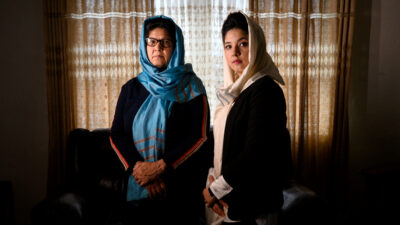Duniya Stanikzai came to the U.S. to advance her education when doing so in her home country wasn’t possible. I met her through her mother’s lawyer. Articulate and assertive, Duniya is a lawyer too.
Duniya’s mother, Jamila, an attorney in Afghanistan, risked her safety to practice law under Taliban rule. And she was here for her daughter when Duniya graduated last spring from the University of Pittsburgh with a master’s degree in comparative law.
What they had not anticipated was that their home country would fall back into the hands of the Taliban — again, making it unsafe for Jamila.
Still, they were fortunate.
In August, President Biden announced that U.S. troops would be leaving Afghanistan, sending people into hysteria mode.
By Aug. 15, Kabul was in the hands of the Taliban.
Leading up to that, Afghan women knew that the modicum of freedom they had enjoyed since the start of Operation Enduring Freedom in 2001 was about to come to a halt.
The Taliban’s ruthless violence and hatred towards women is no secret.
Duniya, who came to the U.S. in 2019, watched with horror as the events unfolded.
She knew this sudden change could mean a death sentence for her loved ones, but she was thankful that her mother was with her.
Jamila’s passion was to help women navigate their precarious status as wives and daughters. But as one of the first female lawyers in Afghanistan, her work as a family attorney had caused her and her family to live in fear.
Women under Taliban rule are viewed as an appendage to the men in their family. They had few rights outside of their roles as wives, daughters, or mothers.
As a women’s rights advocate, Jamila was constantly harassed and threatened for her work. She worked with German nonprofit organizations to ensure equal rights and legal access to women seeking divorce or other family law rights.
Admitted to the Afghan Bar Association in the early 2000s, after the Taliban fell the first time, Jamila aimed to help women gain access to education and rights.
However, when the Taliban had gained control of the country in the 1990s, her line of work and activism were perceived as a threat, and she and her family became a target. They fled to Pakistan in 1995.
“I don’t want my daughters to experience what I experienced in Afghanistan. It makes me very sad that they will not know my country and they are growing up so far from it, but that is no life for a human being. I want them to be educated and pursue their dreams.” – Duniya Stanikzai
Their return to Afghanistan after the fall of the Taliban rule was not easy, but they were hopeful that they could contribute to the country’s reconstruction.
Being a woman in Afghanistan was almost a curse, Duniya says. Any basic activity or errand required forethought.
The situation was even worse in remote areas where honor killings, marriages of young girls, and other atrocities against women are still common.
Jamila also served as a parliamentary election commissioner and has been involved in government affairs related to women’s rights, including as an advocate for girls and women who have been sexually abused in war zones worldwide.
So, it was no surprise that Duniya decided to follow a similar path. She serves as a legal advisor to international firms based in the U.S. and Afghanistan.
Though they are thankful to be safe, the two still live with worry and fear for family members and friends. Duniya says it feels like the Taliban are holding the Afghan people hostage. Women were, in effect, the first target of the regime when they secured power again.
They wanted women to become invisible again. Their access to health care, education, work, and even movement has been drastically curtailed since August. They are unable to do basic things, because the Taliban consider work, education, and movement to be a threat to the family and men.
Under the Taliban, women must be hidden and should have the sole function of serving men.
“I don’t want my daughters to experience what I experienced in Afghanistan,” Duniya says. “It makes me very sad that they will not know my country and they are growing up so far from it, but that is no life for a human being.
“I want them to be educated and pursue their dreams.”
Jamila knew that returning to Afghanistan now would be tantamount to a death sentence.
As she begins the process to gain asylum, she and Duniya watch what is happening in their home country with disbelief, sadness, and anger.
But, for now, her commitment to human rights and the plight of women in her country must find a different format, with her daughter and her family — in Pittsburgh.







